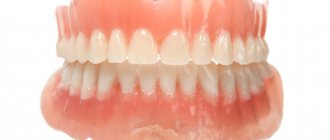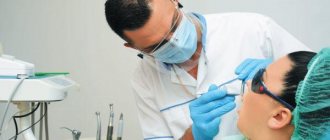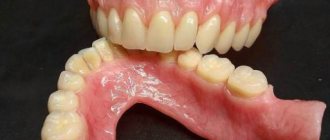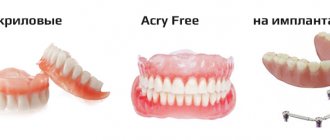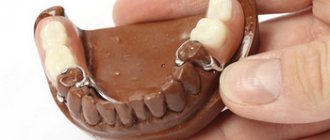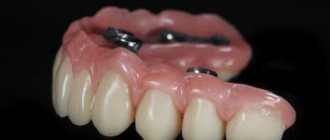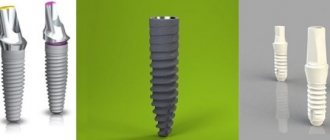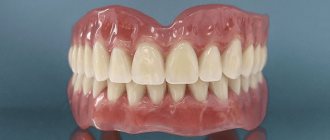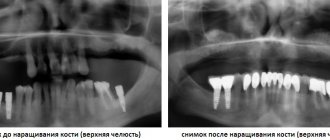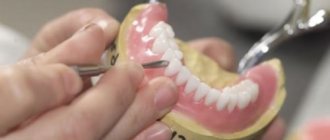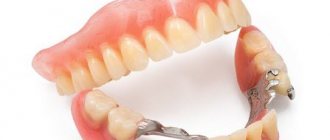- Questions and answers
- Stock
- Reviews
- Prices
- Methods and steps
| Prices | Technologies and stages | All-on-4 prosthetics | All-on-6 prosthetics |
Today, there are various implantation technologies for complete absence of teeth, which are used depending on the clinical picture and financial capabilities of the patient. What are the features of these methods? How to choose the optimal technology? How much does it cost to get full dental implantation in Moscow at NovaDent dental clinics?
Methods of prosthetics for complete absence of teeth
With complete edentia, it is possible to restore the dentition in two ways. The first is the production of a complete removable denture, the second is the installation of implant-supported dentures. The latter method is divided into two types: fixed and removable prosthetics. If we talk about choosing the most optimal treatment option, then in the case of complete absence of teeth, experts recommend dental implantation.
Expert opinion
Vladimir Aleksandrovich Voznyuk
maxillofacial surgeon, implantologist
Experience: more than 33 years
If a situation arises where there is not a single tooth left in the mouth, or their number is minimal, and the quality leaves much to be desired, it is necessary to solve the problem as soon as possible. Lack of normal chewing function, psychological discomfort from poor aesthetics, impaired diction - all this deprives a person of the opportunity to live a normal life. A removable denture has long ceased to be the only panacea. Today there are technologies that make it possible to restore absolutely all teeth with a guarantee of comfort, durability and safety of the result. Moreover, it is possible to personalize the solution to the problem by choosing the implantation option that is right for you.
What are the advantages of implantation with complete edentia?
The main advantage of an implant-supported prosthesis is the reliability of its fixation. Such a denture will never fall out of your mouth at the most inopportune moment. In cases of wearing a complete removable denture, this happens quite often, since the structure is held in the oral cavity due to the suction effect of the palate, the protrusions of the jaw bone and the force of gravity (on the lower jaw). As for fixing gels, firstly, they quite often cause allergies, and secondly, they only help if the error between the prosthetic bed and the prosthesis itself is minimal. If a person has not re-aligned the orthopedic structure for more than three years, in order to securely fasten it, it will be necessary to squeeze out half a tube of the product, which is “eaten” within 5-6 hours, and this, in turn, is fraught with serious gastrointestinal disorders.
It is worth noting that there are a number of methods for improving the fixation and stabilization of such a prosthesis, but no matter how masterfully the doctor masters prosthetic techniques, with complete edentia, wearing a classic complete removable denture still significantly reduces the patient’s quality of life. In addition, a removable denture leads to further bone tissue atrophy, which complicates the implantation procedure in the future.
Is the All-on-4 protocol suitable?
A pressing issue for patients with complete edentia. The protocol is not used in our Center, we will explain why, but first we will understand what its essence is.
"All-on-4" refers to one-stage implantation methods with immediate loading. It involves the installation of 4 implants: 2 in the frontal region, 2 (one on both sides) between the frontal and chewing areas at an angle. This arrangement allows you to avoid building up the jawbone during atrophy. Prosthetics are performed within 2-3 days.
We abandoned this implantation option and are working with a worthy alternative for the following reasons:
- Due to the angular arrangement of the rods and the use of angular abutments, overload is possible in the area of connection of the elements.
- The dentition is not completely restored - a structure of 10 crowns is attached to 4 implants. If you extend it by installing at least 2 more teeth, it may break under load, since there is no support for the end units.
- A plastic prosthesis does not fully restore chewing function and has worse aesthetics due to the artificial gum in its design. When introducing rods using a one-step method, it is not always possible to create an even gingival contour.
- Maintenance is financially expensive and requires frequent visits to the clinic (regular relining, replacement of bushings, special hygiene).
- The angular placement of implants becomes an obstacle to permanent prosthetics. If the patient decides to get rid of a conditionally removable denture and install a full-fledged fixed one without an artificial gum, this will not be possible.
How serious is the gag reflex problem when wearing a classic removable denture?
The gag reflex occurs quite often when using complete removable dentures. Moreover, there are no methods to help rid a patient of it, because this is, in fact, an individual reaction of the body. The fact is that such dentures on the upper jaw must end at the so-called line A, where the hard palate meets the soft palate, otherwise they will not hold. Often, a gag reflex can occur even when taking impressions. In order to carry out the procedure, the doctor has to prescribe the person sedatives or sedation. But if the patient cannot endure the procedure of taking impressions without discomfort, a reasonable question arises: how will he cope with wearing the prosthesis itself?
Covering denture: price 2022
How much does a covering prosthesis cost? The prices below are indicated on a turnkey basis for 2021 (in economy-class and mid-price clinics). The price of the prosthesis will primarily depend on the type of fixation, as well as the number of implants installed.
- Prosthesis on 4 mini-implants Osstem (Korea) with fixation on spherical abutments - the price will be from 100,000 rubles.
- Prosthesis on 2 MIS implants (Israel) with fixation on ball-shaped abutments - price from 110,000 rubles.
- Prosthesis on 2 AstraTech implants (Sweden) with fixation system Locator® – from 140,000 rubles.
- Prosthesis on 2 Straumann implants (Switzerland) with Locator® system fixation – price from 160,000 rubles.
- Beam-type prosthesis on 4 Roott-Form implants (Switzerland) – price from 280,000 rubles.
Advantages of full implantation in terms of ease of eating
If we compare chewing efficiency with classic removable prosthetics and with implant-supported prosthetics, in the latter case it increases significantly, and, as is known, the quality of chewing food affects the condition of the gastrointestinal tract and the body as a whole. Owners of complete removable dentures have to regularly contact a gastroenterologist, who can only offer them to put food through a blender, but any person wants to eat well.
It is also worth noting that the process of chewing with the help of a complete removable denture constantly causes pain, since the structure puts pressure on the mucous membrane, under which there is a periosteum with many nerve endings. When the denture is installed supported by implants, there is no pain, since there is no pressure on the soft tissues.
Implantation in the absence of teeth - how many implants are needed?
The maximum implantation of teeth in the lower jaw, as well as in the upper jaw, is carried out with the installation of up to 14 implants, on each of which a separate crown is fixed - that is, a complete dentition is recreated, not counting wisdom teeth. But this method is not suitable for all patients, since it requires a sufficient volume of bone tissue, and restrictions may also arise due to the proximity of nerves. In addition, installing 28 implants on both jaws using the same number of crowns is a rather expensive procedure, which is not always justified. As for the minimum number of implants, there can be only 8 of them - four on each jaw. This technique is also called “all-on-four implantation.” However, to achieve optimal results, experts recommend 12 - six on each jaw.
Contraindications
General contraindications to full implantation are:
- bleeding disorders,
- oncopathology,
- pregnancy,
- childhood,
- mental disorders.
Classical two-stage implantation and implantation according to the ALL ON 4/6 protocols are also not recommended for diabetes, periodontitis, periodontal disease, hepatitis, smoking (patients with these conditions are offered a less traumatic basal technique).
Is it possible to install mini-implants with complete edentia?
There are certain indications for mini-implants. The main thing is a narrow alveolar ridge, into which it is impossible to install standard-sized implants without replanting bone material. Naturally, osteoplastic surgery increases the cost of the procedure, so many patients prefer more affordable treatment with mini-implants. However, oddly enough, it does not differ much in cost from conventional implantation and, moreover, is associated with certain difficulties.
The main feature of mini-implants is that, unlike classical designs, they are non-removable, that is, they do not require the installation of an abutment. Crowns or bridges are installed directly on the tip of the implant, which acts as a kind of lock. Such a unique structure of the implant imposes certain obligations on the specialist and requires special skills from him. Firstly, mini-implants must be installed strictly parallel to each other, otherwise the prosthesis attached to them will not fit tightly in the oral cavity. And secondly, the load exerted on the structure must be minimal, otherwise there is a risk of rejection.
Bone grafting: is it always mandatory?
The need for bone grafting arises when the patient has a clear lack of natural bone material - in thickness or height. If this deficiency is small, then it is possible to combine operations and carry out all manipulations simultaneously with prosthetics on implants.
If the lack of natural bone material is pronounced, then before prosthetics on implants a series of manipulations will be carried out to build up the bone material to the required volume and only then the implantation itself. In this case, the restoration process will take a considerable time and may take a year or more.
However, it will be useful to know that in modern dentistry there are techniques that allow you to avoid the mandatory bone grafting procedures before implantation. For example, the restoration of not all dental units, but only up to and including the sixth unit in the dentition of the jaw will allow not to build up the bone in height, since the implants will be placed in the area of the front teeth, in which this indicator is usually normal, as well as in the “ fives." In the future, a permanent prosthesis will be fixed to the implanted roots, and this approach will allow you to obtain an ideal implantation result in terms of aesthetics and functionality without prior bone grafting.
If the height of the bone is normal, but there is a problem with its thickness, then implants of a special design, developed specifically for such cases, can help to do without bone grafting, but in this case it is worth choosing the right artificial roots for implantation. Not all implants from all manufacturers are able to withstand high loads.
FUN FACT: The best way to avoid bone grafting is to not put off restoring your teeth. The longer dental restoration is delayed, the more the jawbone becomes thinner.
Cost of full dental implantation
Similar treatment in Moscow dentistry, including all accompanying procedures, is offered at a cost of 180,000 rubles and more. The price of implantation in the absence of teeth will be higher if a larger number of implants are installed, and more expensive materials are used to make the prosthesis itself. In any case, even the cheapest prosthetics on implants will be an order of magnitude better than a classic removable denture, which significantly reduces a person’s quality of life, especially when it comes to elderly patients.
Tips for choosing the type of implants
For prosthetics on implants, products of different types and from various global manufacturers can be used. Artificial roots for implantation are available in a wide range of types and prices, but not all of the implantation systems present on the market have passed the necessary clinical trials and time-tested. In addition, not all implant options are widely used in Russia, which can lead to difficulties if it is necessary to additionally order any components for the system.
When choosing a system for prosthetics on implants in the absence of teeth, you should first consider the options offered by world-famous manufacturers and widely used in modern dentistry. When selecting implants, close attention should be paid to its connection, since the density of the artificial root in the bone and its stability and ability to withstand increased loads depend on this element.
It is also worth studying the data on the material used to manufacture implants. Research shows that the healing process of those structures that are made of pure titanium occurs faster. The more impurities are added to the production material, the longer the process of integrating the implant with the natural tissues of the human body will take. No less important is the type of surface of the implants that will be used during the restoration process.
Each brand manufacturer processes implant surfaces using its own unique technology. Special treatment of the surfaces of implants from some companies makes it possible to ensure and accelerate the process of fusion of the structure with the natural bone material of the human body, and in addition, makes it possible to use implant systems in people suffering from various pathologies of the blood and blood vessels, and autoimmune diseases.
And one more key point: even after studying all the criteria for competently choosing implants for prosthetics, do not make your own choice of system. Only a qualified implantologist can select implants and the procedure method after assessing the clinical picture of a particular case. For detailed advice from a specialist in prosthetics on implants, contact our dentistry in Moscow - Vanstom! Address of our clinic: Moscow, Baumanskaya metro station, st. Bakuninskaya, 17/28.
Calculate the cost of treatment by taking a short test in 20 seconds!
Do not delay your treatment, because in this matter time plays against us.
